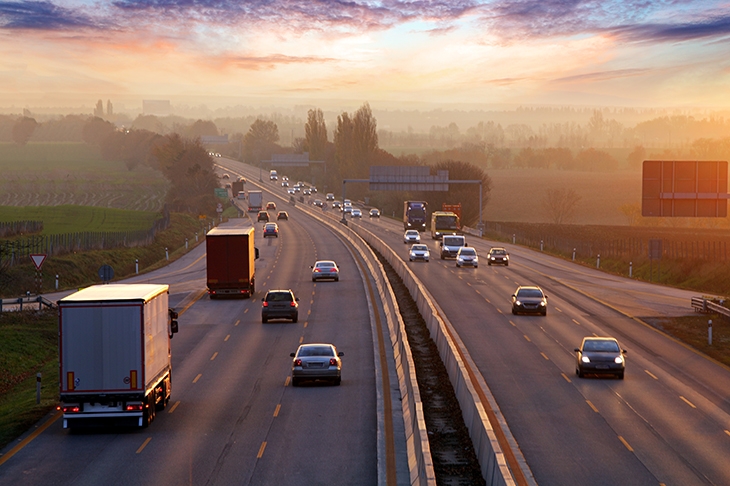‘An attempted improvement which actually makes things worse.’ The Germans have a name for this — Verschlimmbesserung — and I ran into a perfect example the other day when my power suddenly failed in the fast lane of one of those so-called ‘smart’ motorways.
These are the new breed of motorways so clever and advanced that they don’t have hard shoulders on to which you can retreat in emergencies. No: instead, if you can’t make one of the safe haven pull-ins supposedly spaced every mile and a half, then you get the thrilling (and, you pray, never-to-be-repeated experience) of grinding to a halt in the live lane of a motorway, with lorries thundering towards your rear at 50mph.
Utterly terrifying though it was, it happened so quickly I barely had time to panic. I do remember various confused, self–pitying thoughts running round my head, like: ‘This is a German car. This cannot be happening.’ But the dominant part of my brain just got on with the business of saving me: accelerator, no response, mirror, coast into the slow lane, get ready to get out and — get out really quickly, hare round the front of the car, hurdle the barrier. Then head in the direction of the oncoming traffic so that if/when the car gets taken out by a lorry you in turn don’t get hit by your car as it flies on to the verge.
The first five minutes were the worst. (Imagine if I’d had an elderly or disabled passenger. Or a baby to retrieve from a baby seat.) I don’t know how many near–collisions I witnessed, lorries — and cheeky car drivers trying to overtake on the inside lane — swerving at the last second to avoid my stranded motor. Destruction seemed so inevitable I’d already started making plans about what car I’d get next.
But at least with all this newfangled smart camera technology they spot you and get you off pretty quickly, right? Wrong. In the first few minutes, the other arm frantically wafting the ‘slow down’ signal, I called first 999, then Northamptonshire police, then the AA. Still nobody came for a whole hour. Nor, from the way the traffic moved, did there appear any indication that the overhead gantries had been deployed to close the lane. (Either that or, as quite often happens, drivers were completely ignoring the red X sign.)
What averted disaster was the quick thinking and generosity of a paramedic on his way with his wife and kids to his mum’s for Sunday lunch. He pulled up his pick-up behind my car, backed up 50 yards, and acted as a barrier with his blue lights flashing. I wish I’d taken his name so I could thank him properly — and send my apologies to his mum for having kept her waiting half an hour.
Eventually, the rescuers came by chance. None of my calls had had any effect. (The police are only interested if there are injuries, I was told.) Nor had the cameras noticed me (I was apparently in a blind spot). But a maintenance vehicle driving in the gap between the two carriageways saw me and alerted the recovery truck. ‘We were only ten minutes away. We could have been there much quicker if someone had told us,’ said the driver.
Almost everyone thinks smart motorways are stupid. Police dislike them because they’re hazardous (a passenger was killed on one last year after her car had broken down, just like mine, in a live lane of the M1); recovery vehicles find it much harder to do their job because they can’t just scoot up the hard shoulder but have to fight through the tailback; drivers hate them because they are confusing, because the variable speed limits often seem to bear no relation to traffic conditions, and because they’re being used as a cash cow for speeding fines (many for people going slower than the 70mph national limit). In 2016, a cross-party committee of MPs warned that while smart motorways were a cheap way of cutting congestion by expanding capacity, they were a ‘short cut at the expense of lives’.
About the only people who seem to like smart motorways are the bean-counters at Highways England (formerly the Highways Agency). They argue that since the money isn’t available to build new motorways or widen existing ones, this is the best option. Possibly. But to me this says more about the crumbling state of Britain, about the complacency and remoteness of our authorities, and about the failure of successive governments to consult or communicate or represent than it does about optimal scenarios.
Anyone who uses a car or van or lorry with any regularity knows that Britain’s roads are increasingly a nightmare to use. Given the option, I suspect most of us would more than happily pay extra, whether via tolls or a hypothecated tax, and also accept a modicum more risk, in return for the freedom to drive our cars faster on better, less congested highways.
But it’s not an option we’re ever given. The authorities in charge of our highways — whether police, local and national government, or traffic experts — appear to be motivated primarily by an utter contempt for motorists. They see us as cash cows, as reckless imbeciles who stubbornly refuse to be told what to do by random inexplicable signs from above, as polluters, as speed freaks, as selfish individualists who won’t use public transport like we should. Our transport system, in other words, has been captured by a minority of puritanical, finger-wagging, liberty–loathing collectivists. And we, the majority, just don’t get a say. Perhaps it’s time we started putting on our gilets jaunes. One of our most cherished freedoms is at stake — and we’re losing it fast.







Comments